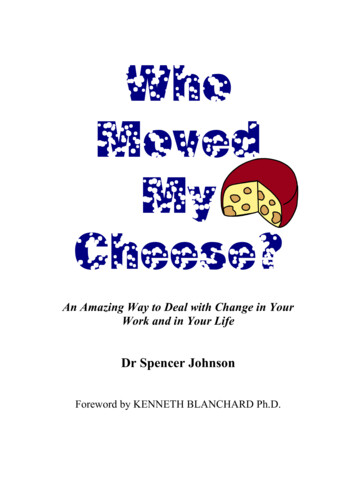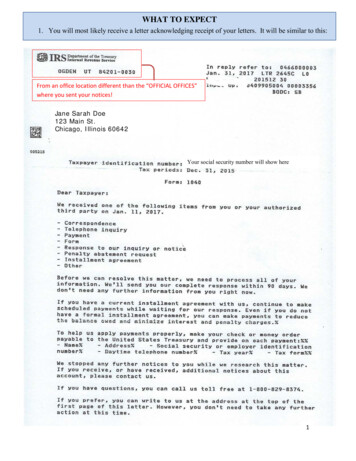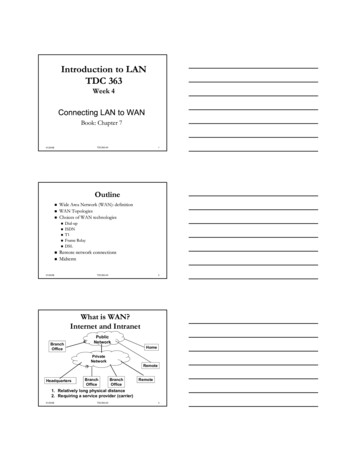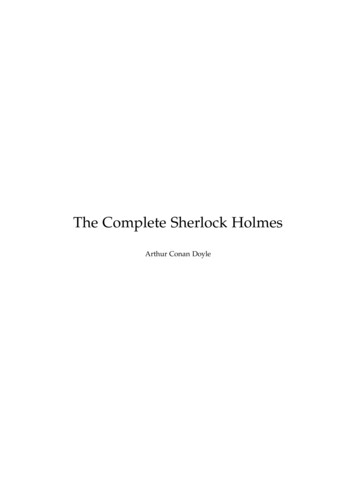
Transcription
WhoMovedMyCheese?An Amazing Way to Deal with Change in YourWork and in Your LifeDr Spencer JohnsonForeword by KENNETH BLANCHARD Ph.D.
The Story Behind The Storyby Kenneth Blanchard, Ph.D.I am thrilled to be telling you “the story behind the story” of Who Moved My Cheese?because it means the book has now been written, and is available for all of us to read,enjoy and share with others.This is something I've wanted to see happen ever since I first heard Spencer Johnsontell his great “Cheese” story, years ago, before we wrote our book The One MinuteManager together. I remember thinking then how good the story was and how helpfulit would be to me from that moment on.Who Moved My Cheese? is a story about change that takes place in a Maze where fouramusing characters look for “Cheese”-cheese being a metaphor for what we want tohave in life, whether it is a job, a relationship, money, a big house, freedom, health,recognition, spiritual peace, or even an activity like jogging or golf.Each of us has our own idea of what Cheese is, and we pursue it because we believe itmakes us happy. If we get it, we often become attached to it. And if we lose it, or it'staken away, it can be traumatic.The “Maze” in the story represents where you spend time looking for what you want.It can be the organization you work in, the community you live in, or the relationshipsyou have in your life.I tell the Cheese story that you are about to read in my talks around the world, andoften hear later from people about what a difference it has made to them.Believe it or not, this little story has been credited with saving careers, marriages andlives!One of the many real-life examples comes from Charlie Jones, a well-respectedbroadcaster for NBC- TV, who revealed that hearing the story of “Who Moved MyCheese?” saved his career. His job as a broadcaster is unique, but the principles helearned can be used by anyone.Here's what happened: Charlie had worked hard and had done a great job ofbroadcasting. Track and Field events at an earlier Olympic Games, so he wassurprised and upset when his boss told him he'd been removed from these showcaseevents for the next Olympics and assigned to Swimming and Diving.Not knowing these sports as well, he was frustrated. He felt unappreciated and hebecame angry. He said he felt it wasn't fair! His anger began to affect everything hedid.Then, he heard the story of “Who Moved My Cheese?”After that he said he laughed at himself and changed his attitude. He realized his bosshad just “moved his Cheese.” So he adapted. He learned the two new sports, and inthe process, found that doing something new made him feel young.
It wasn't long before his boss recognized his new attitude and energy, and he soon gotbetter assignments. He went on to enjoy more success than ever and was laterinducted into Pro Football's Hall of Fame-Broadcasters' Alley.That's just one of the many real-life stories I've heard about the impact this story hashad on people-from their work life to their love life.I'm such a strong believer in the power of “Who Moved My Cheese?” that I recentlygave a copy of an early pre-publication edition to everyone (more than 200 people)working with our company. Why?Because like every company that wants to not only survive in the future but staycompetitive, Blanchard Training & Development is constantly changing. They keepmoving our “cheese.” While in the past we may have wanted loyal employees, todaywe need flexible people who are not possessive about “the way things are donearound here.”And yet, as you know, living in constant white water with the changes occurring allthe time at work or in life can be stressful, unless people have a way of looking atchange that helps them understand it. Enter the Cheese story.When I told people about the story and then they got to read Who Moved My Cheese?you could almost feel the release of negative energy beginning to occur. Person afterperson from every department went out of their way to thank me for the book and toldme how helpful it had been to them already in seeing the changes going on in ourcompany in a different light. Believe me, this brief parable takes little time to read butits impact can be profound.As you turn the pages, you will find three sections in this book. In the first, AGathering, former classmates talk at a class reunion about trying to deal with thechanges happening in their lives. The second section is The Story of Who Moved MyCheese?, the core of the book. In the third section, A Discussion, people discuss whatThe Story meant to them and how they are going to use it in their work and in theirlives.Some readers of this book's early manuscript preferred to stop at the end of The Story,without reading further, and interpret its meaning for themselves. Others enjoyedreading A Discussion that follows because it stimulated their thinking about how theymight apply what they'd learned to their own situation. In any case, I hope each timeyou re-read Who Moved My Cheese? you will find something new and useful in it, asI do, and that it will help you deal with change and bring you success, whatever youdecide success is for you.I hope you enjoy what you discover and I wish you well. Remember: Move with thecheese!Ken BlanchardSan Diego
A GatheringChicagoOne sunny Sunday in Chicago, several former classmates gathered for lunch, havingattended their high school reunion the night before. They wanted to hear more about whatwas happening in each other’s lives. After a good deal of kidding, and a good meal, theysettled into an interesting conversation.Angela, who had been one of the most popular people in the class, said, “Life sure turnedout differently than I thought it would when we were in school. A lot has changed.”“It certainly has,” Nathan echoed. They knew he had gone into his family’s business,which had operated pretty much the same and had been a part of the local community foras long as they could remember. So, they were surprised when he seemed concerned. Heasked, “But, have you noticed how we don’t want to change when things change?”Carlos said, “I guess we resist changing because we’re afraid of change.”“Carlos, you were Captain of the football team,” Jessica said. “I never thought I’d hearyou say anything about being afraid!”They all laughed as they realized that although they had gone off in different directions –from working at home to managing companies – they were experiencing similar feelings.Everyone was trying to cope with the unexpected changes that were happening to them inrecent years. And most admitted that they did not know a good way to handle them.Then Michael said, “I used to be afraid of change. When a big chance came along in ourbusiness, we didn’t know what to do. So we didn’t do anything differently and we almostlost it.”“That is,” he continued, “until I heard a funny little story that changed everything.”“How so?” Nathan asked“Well, the story altered the way I looked at change, and after that, things quicklyimproved for me – at work and in my life.”“Then, I passed the story on to some people in our company and they passed it on toothers, and soon our business did much better, because we all adapted to change better.And like me, many people said helped them in their personal lives.”“What’s the story?” Angela asked.“It’s called, ‘Who Moved My Cheese?”The grouped laughed. “I think I like it already,” Carlos said, “Would you tell us thestory?”“Sure,” Michael replied. “I’d be happy to – it doesn’t take long.” And so he began:
The StoryOnce, long ago in a land far away, there lived four little characters who ran through amaze looking for cheese to nourish then and make them happy.Two were mice named “Sniff” and “Scurry” and two were littlepeople – beings whowere as small as mice but who looked and acted a lot like people today. Their nameswere “Hem” and “Haw”.Due to their small size, it would be easy not to notice what the four of them weredoing. But if you looked closely enough, you could discover the most amazing things!Every day the mice and the littlepeople spent time in the maze looking for their ownspecial cheese.The mice, Sniff and Scurry, possessing only simple rodent brains, but good instincts,searched for the hard nibbling cheese they liked, as mice often do.The two people, Hem and Haw, used their brains, filled with many beliefs, to searchfor a very different kind of Cheese – with a capital C – which they believed wouldmake them feel happy and successful.As different as the mice and littlepeople were, they shared something in common:every morning, they each put on their jogging suits and running shoes, left their littlehomes, and race out into the maze looking for their favorite cheese.The maze was a labyrinth of corridors and chambers, some containing deliciouscheese. But there were also dark corners and blind alleys leading nowhere. It was easyplace for anyone to get lost.However, the two littlepeople, Hem and Haw, used a different method that relied ontheir ability to think and learn from their past experiences, although, they wouldsometimes get confused by their beliefs and emotions.Eventually in their own way, they all discovered what they were looking for – theyeach found their own kind of cheese one day at the end of one of the corridors inCheese Station C.Every morning after that, the mice and the littlepeople dressed in their running gearand headed over to Cheese Station C. It wasn’t long before they each established theirown routine.Sniff and Scurry continued to wake early every day and race through the maze,always following the same route.When they arrived at their destination, the mice took off their running shoes, tiedthem together and hung them around their necks – so they could get to them quicklywhenever they needed them again. Then they enjoyed the cheese.
In the beginning Hem and Haw also raced toward Cheese Station C every morning toenjoy the tasty new morsels that awaited them.But after a while, a different routine set in for the littlepeople.Hem and Haw awoke each day a little later, dressed a little slower, and walked toCheese Station C. After all, they knew where the Cheese was now and how to getthere.They had no idea where the Cheese came from, or who put it there. They just assumedit would be there.As soon as Hem and Haw arrived at Cheese Station C each morning, they settled inand made themselves at home. They hung up their jogging shoes and out on theirslippers. They were becoming very comfortable now that they had found the Cheese.“This is great,” Hem said. “There’s enough Cheese here to last us forever.” Thelittlepeople felt happy and successful, and thought they were secure.It wasn’t long before Hem and Haw regarded the Cheese they found at Cheese StationC as their cheese. It was such a large store of Cheese that they eventually moved theirhomes to be closer to it, and built a social life around it.To make themselves feel more at home, Hem and Haw decorated the walls withsayings and even pictures of Cheese around them which made them smile. One read:Having CheeseMakes YouHappy.
Sometimes Hem and Haw would take their friends by in to see their pile of Cheese atCheese Station C, and point to it with pride, saying, “Pretty nice Cheese, huh?”Sometimes they shared it with their friends and sometimes they didn’t.“We deserve this Cheese,” Hem said. “We certainly had to work long and hardenough to find it.” He picked up a nice fresh piece and ate it.Afterwards, Hem fell asleep, as he often did.Every night the littlepeople would waddle home, full of Cheese, and every morningthey would confidently return for more.This went on for quite some time.After a while Hem’s and Haw’s confidence grew into arrogance. Soon they became socomfortable they didn’t even notice what was happening.As time went on, Sniff and Scurry continued their routine. They arrived early eachmorning and sniffed and scratched and scurried around Cheese Station C, inspectingthe area to see if there had been any changes from the day before. Then they would sitdown to nibble on the cheese.One morning they arrived at Cheese Station C and discovered there was no cheese.They weren’t surprised. Since Sniff and Scurry had noticed the supply of cheese hadbeen getting smaller every day, they were prepared for the inevitable and knewinstinctively what to do.They looked at each other, removed the running shoes they had tied together and hungconveniently around their necks, put them on their feet and laced them up.The mice did not overanalyze things. And they were not burdened with manycomplex beliefs.To the mice, the problem and the answer were both simple. The situation at CheeseStation C had changed. So, Sniff and Scurry decided to change.They both looked out into the maze. Then Sniff lifted his nose, sniffed, and nodded toScurry, who took off running through the maze, while Sniff followed as fast as hecould.They were quickly off in search of New Cheese.Later that same day, Hem and Haw arrived at Cheese Station C. They had not beenpaying attention to the small changes that had been taking place each day, so theytook it for granted their Cheese would be there.They were unprepared for what they found.
“What! No Cheese?” Hem yelled. He continued yelling, “No Cheese? No Cheese?” asthough if he shouted loud enough someone would put back.“Who moved my Cheese?” he hollered.Finally, he put his hands on his hips, his face turned red, and he screamed at the top ofhis voice, “It’s not fair!”Haw just shook his head in disbelief. He, too, had counted on finding Cheese atCheese Station C. He stood there for a long time, frozen with chock. He was just notready for this.Hem was yelling something, but Haw didn’t want to hear it. He didn’t want to dealwith what was facing him, so he just turned everything out.The littlepeople’s behavior was not very attractive or productive but it wasunderstandable.Finding Cheese wasn’t easy, and it meant a great deal more to the littlepeople thanjust having enough of it to eat everyday.Finding Cheese was the littlepeoples’ way of getting what they though they needed tobe happy. They had their own ideas of what Cheese meant to them, depending ontheir taste.For some, finding Cheese was having material things. For others it was enjoying goodhealth, or developing a spiritual sense of well-being.For Haw, Cheese just meant feeling safe, having a loving family someday and livingin a cozy cottage on Cheddar Lane.To Hem, Cheese was becoming A Big Cheese in charge of others and owning a bighouse atop Camembert Hill.Because Cheese was important to them, the two littlepeople spent a long time tryingto decide what to do. All they could think trying to decide what to do. All they couldthink of was to keep looking around Cheeseless Station C to se of the Cheese wasreally gone.While Sniff and Scurry had quickly moved on, Hem and Haw continued to hem andhaw.They ranted and raved at the injustice of it all. Haw started to get depressed. Whatwould happen if the Cheese wasn’t there tomorrow? He had if the Cheese wasn’tthere tomorrow? He had made future plans based on this Cheese. The littlepeoplecouldn’t believe it. How could this have happened? No one had warned them. Itwasn’t right. It was not the way things were supposed to be.Hem and Haw went home that night hungry and discouraged. But before they left,Haw wrote on the wall:
The More ImportantYour Cheese Is To YouThe More You Want ToHold On To It.The next day Hem and Haw left their homes, and returned to Cheese Station C again,where they still expected, somehow, to find their Cheese.The situation hadn’t changed, the Cheese was no longer there. The littlepeople didn’tknow what to do. Hem and Haw just stood there, immobilized like two statues.Haw shut his eyes as tight as he could and put his hands over his ears. He just wantedto block everything out. He didn’t want to know the Cheese supply had graduallybeen getting smaller. He believed it had been moved all of a sudden.Hem analyzed the situation over and over and eventually his complicated brain withits huge belief system took hold. “Why did they do this to me?” he demanded.“What’s really going on here?”Finally Haw opened his eyes, looked around and said, “By the way, where are Sniffand Scurry? Do you think they know something we don’t?”Hem scoffed, “What would they know?”Hem continued, “They’re just simple mice. They just respond to what happens. We’relittlepeople. We’re special. We should be able to figure this out. And, besides, wedeserve better.”“This should not happen to us, or if it does, we should at least get some benefits.”“Why should we get benefits?” Haw asked.“Because we’re entitled,” Hem claimed.
“Entitled to what?” Haw wanted to know.“We’re entitled to our Cheese.”“Why?” Haw asked.“Because, we didn’t cause this problem,” Hem said. “Somebody else did this and weshould get something out of it.”Haw suggested, “Maybe we should stop analyzing the situation so much and just getgoing and find some New Cheese.”“Oh no,” Hem argued. “I’m going to get to the bottom of this.”While Hem and Haw were still trying to decide what to do, Sniff and Scurry werealready on their way. They went further into the maze, up and down corridors,looking for cheese in every Cheese Station they could find.They didn’t think of anything else but finding New Cheese.They didn’t find any for sometime until they finally went into an area of the mazewhere they had never been before: Cheese Station N.They squealed with delight. They found what they had been looking for a great supplyof New Cheese.They could hardly believe their eyes. It was the biggest store of cheese the mice hadever seen.In the meantime, Hem and Haw were still back in Cheese Station C evaluating theirsituation. They were now suffering from the effects of having no Cheese. They werebecoming frustrated and angry and were blaming each other for the situation theywere in.Now and then Haw thought about his mice buddies, Sniff and Scurry, and wonderedof they had found any cheese yet. He believed they might be having a hard time, asrunning through the maze usually involved some uncertainty. But he also knew that itwas likely to only last for a while.Sometimes, Haw would imagine Sniff and Scurry finding New Cheese and enjoyingit. He thought about how good it would be for him to be out on an adventure in themaze, and to find fresh New Cheese. He could almost taste it.The more clearly Haw saw the image of himself finding and enjoying the NewCheese, the more he saw himself leaving Cheese Station C.“Let’s go!” he exclaimed, all of a sudden.
“No,” Hem quickly responded. “I like it here. It’s comfortable. It’s what I know.Besides it’s dangerous out there.”“No, it isn’t,” Haw argued. “We’ve run through many parts of the maze before, andwe can do it again.”“I’m getting too old for that,” Hem said. “And I’m afraid I’m not interested in gettinglost and making a fool of myself. Are you?”With that, Haw’s fear of falling returned and his hope of finding New Cheese faded.So everyday, the littlepeople continued to do what they had done before. They went toCheese Station C, found no Cheese, and returned home, carrying their worries andfrustrations with them.They tried to deny what was happening, but found it harder to get to sleep, had lessenergy the next day, and were becoming irritable.Their homes were not the nurturing places they once were. The littlepeople haddifficulty sleeping and were having nightmares about not finding any Cheese.But Hem and Haw still returned to Cheese Station C and waited there everyday.Hem said, “You know, if we just work harder we'll find that nothing has reallychanged that much. The Cheese is probably nearby. Maybe they just hid it behind thewall.”The next day, Hem and Haw returned with tools. Hem held the chisel while Hawbanged on the hammer until they made a hole in the wall of Cheese Station C. Theypeered inside but found no Cheese.They were disappointed but believed they could solve the problem. So they startedearlier, stayed longer, and worked harder. But after a while, all they had was a largehole in the wall.Haw was beginning to realize the difference between activity and productivity.“Maybe,” Hem said, “we should just sit here and see what happens. Sooner or laterthey have to put the Cheese back.”Haw wanted to believe that. So each day he went home to rest and returnedreluctantly with Hem to Cheese Station C. But Cheese never reappeared.By now the littlepeople were growing weak from hunger and stress. Haw was gettingtired of just waiting for their situation to improve. He began to see that the longer theystayed in their Cheeseless situation, the worse off they would be.Haw knew they were losing their edge.
Finally, one day Haw began laughing at himself. “Haw, haw, look at me. I keep doingthe same things over and over again and wonder why things don't get better. If thiswasn't so ridiculous, it would be even funnier.”Haw did not like the idea of having to run through the maze again, because he knewhe would get lost and have no idea where he would find any Cheese. But he had tolaugh at his folly when he saw what his fear was doing to him.He asked Hem, “Where did we put our jogging suits and running shoes?” It took along time to find them because they had put everything away when they found theirCheese at Cheese Station C, thinking they wouldn't be needing them anymore.As Hem saw his friend getting into his running gear, he said, “You're not really goingout into the maze again, are you? Why don't you just wait here with me until they putthe Cheese back?”“Because, you just don't get it,” Haw said. “I didn't want to see it either, but now Irealize they're never going to put the Old Cheese back. That was yesterday's Cheese.It's time to find New Cheese.”Hem argued, “But what if there is no Cheese out there? Or even if there is, what ifyou don't find it?”“I don't know,” Haw said. He had asked himself those same questions too many timesand started to feel the fears again that kept him where he was.Then he thought about finding New Cheese and all the good things that came with itand gathered his courage.“Sometimes,” Haw said, “things change and they are never the same again. This lookslike one, of those times, Hem. That's life! Life moves on. And so should we.”Haw looked at his emaciated companion and tried to talk sense to him, but Hem's fearhad turned into anger and he wouldn't listen.Haw didn't mean to be rude to his friend, but he had to laugh at how silly they bothlooked.As Haw prepared to leave, he started to feel more alive, knowing that he was finallyable to laugh at himself, let go and move on.He announced, “It's maze time!”Hem didn't laugh and he didn't respond.Haw picked up a small, sharp rock and wrote a serious thought on the wall for Hem tothink about. As was his custom, Haw even drew a picture of cheese around it, hopingit would help Hem to smile, lighten up, and go after the New Cheese. But Hem didn'twant to see it. It read:
If You Do NotChange, You CanBecome Extinct.Then, Haw stuck his head out and peered anxiously into the maze. He thought abouthow he'd gotten himself into this cheeseless situation.He had believed that there may not be any Cheese in the maze, or he may not find it.Such fearful beliefs were immobilizing and killing him.Haw smiled. He knew Hem was wondering, “Who moved my Cheese?” but Haw waswondering, “Why didn't I get up and move with the Cheese sooner?”As he started out into the maze, Haw looked back to where he had come from and feltits comfort. He could feel himself being drawn back into familiar territory - eventhough he hadn't found Cheese there for some time.Haw became more anxious and wondered if he really wanted to go out into the maze.He wrote a saying on the wall ahead of him and stared at it for some time:What Would YouDo If YouWeren’t Afraid?
He thought about it.He knew sometimes some fear can be good. When you are afraid things are going toget worse if you don't do something, it can prompt you into action. But it is not goodwhen you are so afraid that it keeps you from doing anything.He looked to his right, to the part of the maze where he had never been, and felt thefear.Then, he took a deep breath, turned right into the maze, and jogged slowly, into theunknown.As he tried to find his way, Haw worried, at first, that he might have waited too longin Cheese Station C. He hadn't had any Cheese for so long that he was now weak. Ittook him longer and it was more painful than usual to get through the maze. Hedecided that if he ever got the chance again, he would adapt to change sooner. Itwould make things easier.Then, Haw smiled a weak smile as he thought, “Better late than never.”During the next several days, Haw found a little Cheese here and there, but nothingthat lasted very long. He had hoped to find enough Cheese to take some back to Hemand encourage him to come out into the maze.But Haw didn't feel confident enough yet. He had to admit, he found it confusing inthe maze. Things seemed to have changed since the last time he was out here.Just when he thought he was getting ahead, he would get lost in the corridors. Itseemed his progress was two steps forward and one step backwards. It was achallenge, but he had to admit that being back in the maze, hunting for Cheese, wasn'tnearly as bad as he feared it might be.As time went on he began to wonder if it was realistic for him to expect to find NewCheese. He wondered if he had bitten off more than he could chew. Then he laughed,realizing that he had nothing to chew on at the moment.Whenever he started to get discouraged he reminded himself that what he was doing,as uncomfortable as it was at the moment, was in reality much better than staying inthe Cheeseless situation. He was taking control, rather than simply letting thingshappen to him.Then he reminded himself, if Sniff and Scurry could move on, so could he!Later, as Haw looked back on things, he realized that the Cheese at Cheese Station Chad not just disappeared overnight, as he had once thought. The amount of Cheesethat had been there toward the end had been getting smaller, and what was left hadgrown old. It didn't taste as good.
Mold may even have begun to grow on the Old Cheese, although he hadn't noticed it.He had to admit however, that if he had wanted to, he probably could have seen whatwas coming. But he didn't.Haw now realized that the change probably would not have taken him by surprise ifhe had been watching what was happening all along and if he had anticipated change.Maybe that's what Sniff and Scurry had been doing. He stopped for a rest and wroteon the wall of the maze:Smell The CheeseOften So You KnowWhen It Is Getting Old.Sometime later, after not finding Cheese for what seemed like a long time, Hawfinally came across a huge Cheese Station which looked promising. When he wentinside, however, he was most disappointed to discover that the Cheese station wasempty.“This empty feeling has happened to me too often,” he thought. He felt like giving up.Haw was losing his physical strength. He knew he was lost and was afraid he wouldnot survive. He thought about turning around and heading back to Cheese Station C.At least, if he made it back, and Hem was still there, Haw wouldn't be alone. Then heasked himself the same question, again: “What would I do if I weren't afraid?”He was afraid more often than he liked to admit, even to himself. He wasn't alwayssure what he was afraid of, but, in his weakened condition, he knew now he wassimply fearful of going on alone. Haw didn't know it, but he was running behindbecause he was weighed down by fearful beliefs.Haw wondered if Hem had moved on, or if he was still paralyzed by his fears. Then,Haw remembered the times when he had felt his best in the maze. It was when he wasmoving along.
He wrote on the wall, knowing it was as much a reminder to himself as it was amarking for his buddy Hem hopefully to follow:Smell TheCheese Often SoYou Know WhenIt Is Getting Old.Haw looked down the dark passageway and was aware of his fear. What lay ahead?Was it empty? Or worse, were there dangers lurking? He began to imagine all kindsof frightening things that could happen to him. He was scaring himself to death.Then he laughed at himself. He realized his fears were making things worse. So hedid what he would do if he wasn't afraid. He moved in a new direction.As he started running down the dark corridor he began to smile. Haw didn't realize ityet, but he was discovering what nourished his soul. He was letting go and trustingwhat lay ahead for him, even though he did not know exactly what it was.To his surprise, Haw started to enjoy himself more and more. “Why do I feel sogood?” he wondered. “I don't have any Cheese and I don't know where I am going.”Before long, he knew why he felt good. He stopped to write again on the wall:When You MoveBeyond Your Fear,You Feel Free.
Haw realized he had been held captive by his own fear. Moving in a new directionhad freed him.Now he felt the cool breeze that was blowing in this part of the maze and it wasrefreshing. He took in some deep breaths and felt invigorated by the movement. Oncehe had gotten past his fear, it turned out to be more enjoyable than he once believed itcould be.Haw hadn't felt this way for a long time. He had almost forgotten how much fun itwas.To make things even better, Haw started to paint a picture in his mind. He sawhimself in great realistic detail, sitting in the middle of a pile of all his favoritecheeses-from Cheddar to Brie! He saw himself eating the many cheeses he liked, andhe enjoyed what he saw. Then he imagined how much he would enjoy all their greattastes.The more clearly he saw the image of New Cheese, the more real it became, and themore he could sense that he was going to find it. He wrote:Imagining MyselfEnjoying New CheeseEven Before I find It,Leads Me To It.“Why didn't I do this befor
you re-read Who Moved My Cheese? you will find something new and useful in it, as I do, and that it will help you deal with change and bring you success, whatever you decide success is for you. I hope you enjoy what yo











